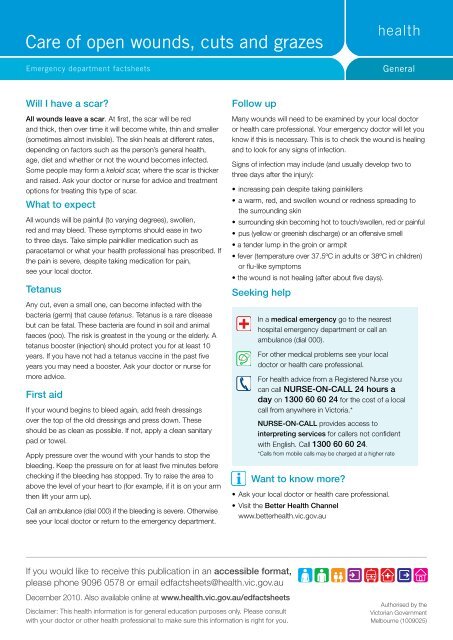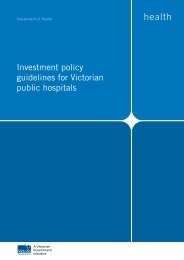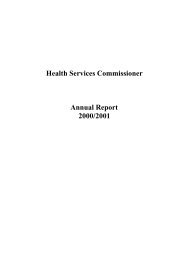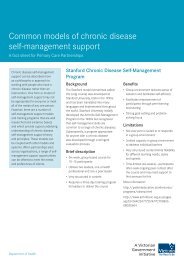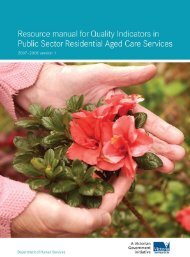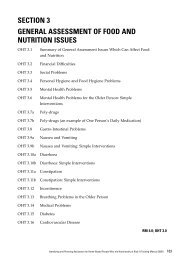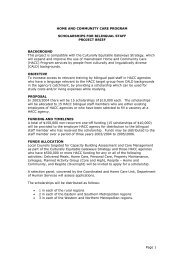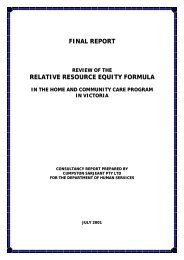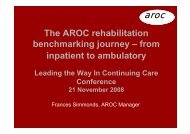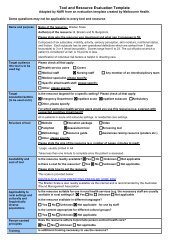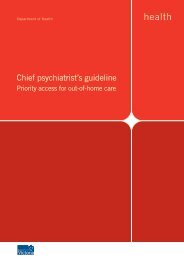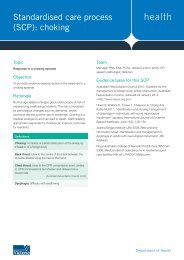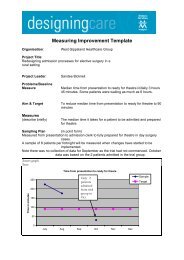Care of open wounds, cuts and grazes - Department of Health
Care of open wounds, cuts and grazes - Department of Health
Care of open wounds, cuts and grazes - Department of Health
Create successful ePaper yourself
Turn your PDF publications into a flip-book with our unique Google optimized e-Paper software.
<strong>Care</strong> <strong>of</strong> <strong>open</strong> <strong>wounds</strong>, <strong>cuts</strong> <strong>and</strong> <strong>grazes</strong><br />
Emergency department factsheets<br />
General<br />
Will I have a scar?<br />
All <strong>wounds</strong> leave a scar. At first, the scar will be red<br />
<strong>and</strong> thick, then over time it will become white, thin <strong>and</strong> smaller<br />
(sometimes almost invisible). The skin heals at different rates,<br />
depending on factors such as the person’s general health,<br />
age, diet <strong>and</strong> whether or not the wound becomes infected.<br />
Some people may form a keloid scar, where the scar is thicker<br />
<strong>and</strong> raised. Ask your doctor or nurse for advice <strong>and</strong> treatment<br />
options for treating this type <strong>of</strong> scar.<br />
What to expect<br />
All <strong>wounds</strong> will be painful (to varying degrees), swollen,<br />
red <strong>and</strong> may bleed. These symptoms should ease in two<br />
to three days. Take simple painkiller medication such as<br />
paracetamol or what your health pr<strong>of</strong>essional has prescribed. If<br />
the pain is severe, despite taking medication for pain,<br />
see your local doctor.<br />
Tetanus<br />
Any cut, even a small one, can become infected with the<br />
bacteria (germ) that cause tetanus. Tetanus is a rare disease<br />
but can be fatal. These bacteria are found in soil <strong>and</strong> animal<br />
faeces (poo). The risk is greatest in the young or the elderly. A<br />
tetanus booster (injection) should protect you for at least 10<br />
years. If you have not had a tetanus vaccine in the past five<br />
years you may need a booster. Ask your doctor or nurse for<br />
more advice.<br />
First aid<br />
If your wound begins to bleed again, add fresh dressings<br />
over the top <strong>of</strong> the old dressings <strong>and</strong> press down. These<br />
should be as clean as possible. If not, apply a clean sanitary<br />
pad or towel.<br />
Apply pressure over the wound with your h<strong>and</strong>s to stop the<br />
bleeding. Keep the pressure on for at least five minutes before<br />
checking if the bleeding has stopped. Try to raise the area to<br />
above the level <strong>of</strong> your heart to (for example, if it is on your arm<br />
then lift your arm up).<br />
Call an ambulance (dial 000) if the bleeding is severe. Otherwise<br />
see your local doctor or return to the emergency department.<br />
Follow up<br />
Many <strong>wounds</strong> will need to be examined by your local doctor<br />
or health care pr<strong>of</strong>essional. Your emergency doctor will let you<br />
know if this is necessary. This is to check the wound is healing<br />
<strong>and</strong> to look for any signs <strong>of</strong> infection.<br />
Signs <strong>of</strong> infection may include (<strong>and</strong> usually develop two to<br />
three days after the injury):<br />
• increasing pain despite taking painkillers<br />
• a warm, red, <strong>and</strong> swollen wound or redness spreading to<br />
the surrounding skin<br />
• surrounding skin becoming hot to touch/swollen, red or painful<br />
• pus (yellow or greenish discharge) or an <strong>of</strong>fensive smell<br />
• a tender lump in the groin or armpit<br />
• fever (temperature over 37.5ºC in adults or 38ºC in children)<br />
or flu-like symptoms<br />
• the wound is not healing (after about five days).<br />
Seeking help<br />
In a medical emergency go to the nearest<br />
hospital emergency department or call an<br />
ambulance (dial 000).<br />
For other medical problems see your local<br />
doctor or health care pr<strong>of</strong>essional.<br />
For health advice from a Registered Nurse you<br />
can call NURSE-ON-CALL 24 hours a<br />
day on 1300 60 60 24 for the cost <strong>of</strong> a local<br />
call from anywhere in Victoria.*<br />
NURSE-ON-CALL provides access to<br />
interpreting services for callers not confident<br />
with English. Call 1300 60 60 24.<br />
*Calls from mobile calls may be charged at a higher rate<br />
Want to know more?<br />
• Ask your local doctor or health care pr<strong>of</strong>essional.<br />
• Visit the Better <strong>Health</strong> Channel<br />
www.betterhealth.vic.gov.au<br />
If you would like to receive this publication in an accessible format,<br />
please phone 9096 0578 or email edfactsheets@health.vic.gov.au<br />
December 2010. Also available online at www.health.vic.gov.au/edfactsheets<br />
Disclaimer: This health information is for general education purposes only. Please consult<br />
with your doctor or other health pr<strong>of</strong>essional to make sure this information is right for you.<br />
Authorised by the<br />
Victorian Government<br />
Melbourne (1009025)


